Richard Henry Pratt forwards to the Commissioner of Indian Affairs two letters he received from the Rosebud Agency. One concerns the deaths of Rosebud students while at Carlisle and the desire of the Rosebud Sioux Chiefs to educate their children closer to home. The second from Black Crow protesting the actions of Spotted Tail and others who…
1881
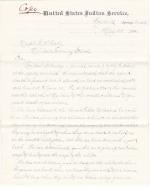
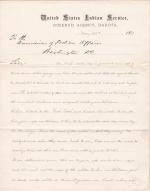
A Council of Sioux Chiefs including Spotted Tail, Two Strike, White Thunder, and Swift Bear from the Rosebud Agency writes to the Commissioner of Indian Affairs to protest the deaths of their children at Carlisle and asks for a local school in order to educate their children along with teachers. U.S. Indian Agent John Cook notes that he is…
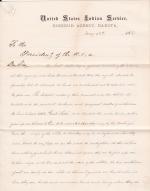
A Council of Sioux Chiefs including Spotted Tail, Two Strike, White Thunder, and Swift Bear from the Rosebud Agency writes to President James A. Garfield to protest the deaths of their children at Carlisle and asks for a local school in order to educate their children along with teachers. U.S. Indian Agent John Cook notes that he is agreement…
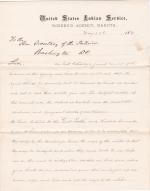
A council of Sioux Chiefs including Spotted Tail, Two Strike, White Thunder, and Swift Bear from the Rosebud Agency writes to the Secretary of the Interior to protest the deaths of their children at Carlisle and asks for a local school in order to educate their children along with teachers. U.S. Indian agent John Cook notes that he is agreement…
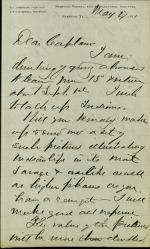
Samuel Chapman Armstrong of the Hampton Institute writes to Richard Henry Pratt informing him of a planned trip abroad to advocate for Native American education. Armstrong asks Pratt to send photographs of various aspects of Native American life for the purposes of his trip.
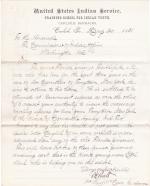
Richard Henry Pratt notifies the Commissioner of Indian Affairs that the former Kiowa prisoner Tsaitkopeta who has been living in Tarrytown, New York with Dr. H. Caruthers wishes to return home to the Kiowa and Comanche Agency. Pratt notes that he is entitled to have the government pay this expense and ends by saying that the only remaining…
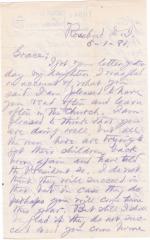
Cook, a member of the Sioux Nation, writes to his daughter Grace at the Carlisle Indian School. He writes that others in the Rosebud Agency are attempting to have their children returned from Carlisle but he does not think they will succeed. If they do though he would like Grace to return although he would also be happy with her staying and…
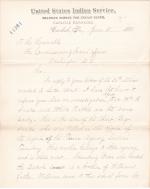
Richard Henry Pratt provides an update on the enrollment status of William Snake and Fred Smith. Pratt notes that William Snake and White Rabbit are the same individual. He also writes that the money for the two students would be better served if invested in cattle or another area rather than sent to the students directly.
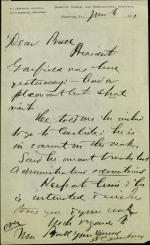
Samuel Chapman Armstrong of the Hampton Institute writes to Richard Henry Pratt sharing details of President James Garfield's visit to Hampton. Armstrong also informs Pratt of his desire to exhibit at a manufacturers' exhibition in Boston and requests that Pratt send him some of his industrial arts materials for the exhibit.
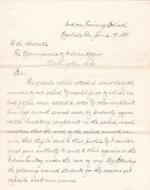
Richard Henry Pratt seeks authority to return eight students home due to measles and scarlet fever outbreaks. To allow them to travel more comfortably, Pratt requests a response via telegraph allowing him to send them on a through car to Kansas City.
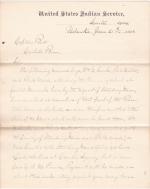
Richard Henry Pratt forwards a letter from Isaiah Lightner, U.S. Indian Agent at the Santee Agency, regarding the enrollment of William Snake, White Rabbit, and White Mouse as members of the Ponca Nation by Standing Bear. As a result of the enrollment they are entitled to a payment being distributed by the Nation.
Pratt forwarded the…
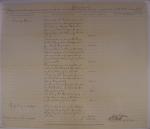
Richard Henry Pratt submits a "Special" Estimate of Funds form for $1,610.80 for travel expenses and pay of irregular employees.
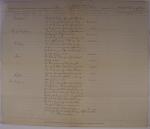
Estimate of funds for the third quarter of 1881 amounting to $13,959.81 for areas covering subsistence, pay of employees, clothing, the farm, supplies, contingencies, and special allowance.
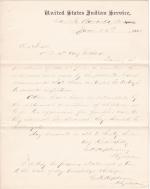
C. H. Hepburn, Carlisle Indian School Physician, informs Richard Henry Pratt that some mattresses should be destroyed due to scarlet fever contamination.
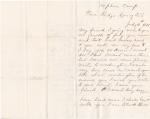
Black Bear writes to Richard Henry Pratt asking for him to write to the Department of Indian Affairs to allow his son Paul Black Bear to visit him during his trip to Washington D.C. Black Bear notes that he has not been allowed permission to visit Carlisle and he was also the first Head Man to allow his son to attend school at Carlisle.
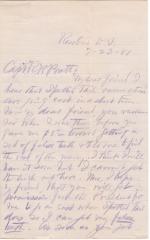
Blue Teeth writes to Richard Henry Pratt seeking his help in order to be included in Spotted Tail's delegation. Blue Teeth writes that he would like to go east in order to get a set of false teeth as well as visiting his children at Carlisle.
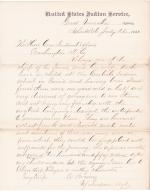
Kihega, a chief of the Iowa Nation, requests funds to allow him, his wife, and an interpreter to visit the Carlisle Indian School to see their children through the U.S. Indian Agent at the Great Nemaha Agency, A. Brosius.
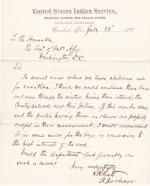
Richard Henry Pratt requests that he be allowed to extend the outings of certain students until the winter in order to allow them to attend the country schools located near their patrons.
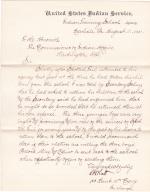
Richard Henry Pratt recommends the return of Pollock, Max, and Oliver Spotted Tail to Carlisle if an opportunity presents itself rather than having the cost born by their family.
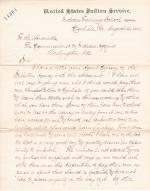
Richard Henry Pratt endorsees a request from the Sisseton Agency U.S. Indian Agent that a number of men be allowed to enroll at Carlisle as they offer to pay their own transportation. Pratt notes that despite the school having more than enough male pupils the spirit evident by the willingness to pay their own way should be fostered. Pratt ends…
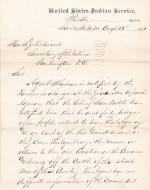
J. M. Haworth, Inspector, details various events in the Pueblo Agency including opposition to the schooling at the agency. Haworth reports that much of the opposition is a result of the religious nature of the schooling. He also notes that parents who had sent children to Carlisle have yet to visit them despite promises made at the time they…
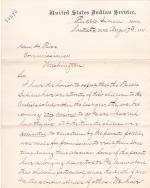
Benjamin M. Thomas, U.S. Indian Agent for the Pueblo Indian Agency, requests on behalf of the Pueblo Nation to take a delegation of eight individuals to visit their children at Carlisle and also to visit Washington D.C. Thomas also requests authority to bring two students to replace a Pueblo student who died at Carlisle and one who was returned…
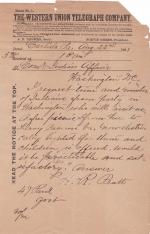
Richard Henry Pratt inquires into the number of visitors to expect from the delegation currently in Washington D.C. He also suggests that the delegation along with their children take a picnic to Luray Caverns in Virginia.
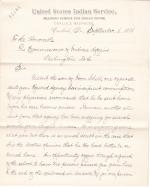
Richard Henry Pratt requests authority to pay for the expenses of returning to their homes Gilbert and Norman due to their poor health.
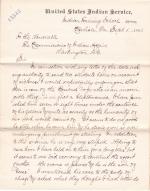
Richard Henry Pratt seeks authority to send James, a member of the Sioux Nation, back to his home.
